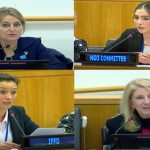Oral Statement by Perrine Bruvier, as representative of IFFD, at the Commission for Social Development 2023, 13th February, on family science as key to understanding all types of families and how family relationships affect us, our families, and society.
Since the World Summit for Social Development in Copenhagen in 1995, the Commission for Social Development (CSocD) has been the key United Nations body in charge of the follow up and implementation of the Copenhagen Declaration and Programme of Action.
Distinguished Chair, Distinguished Delegates, Ladies and Gentlemen,
In order to have substantial contributions to the family policy discussion, the International Federation for Family Development has been actively involved in promoting the Family science approach in the recommendations for the design of family policies.
We understand that family science — the scientific study of families and close interpersonal relationships — is key to understanding all types of families and how family relationships affect us, our families, and society. Family science research shows us strategies to build strong relationships, ways to parent effectively, and so much more to support families’ well-being, which creates a better society for everyone.
It has become crucial to address the big societal issues of the 21st century. A growing number of academic departments and degree programs in the United States and Canada are incorporating the term ‘Family science’ into their names. At least 165 university departments and academic programs currently use it. Through their work across many careers, Family Science scholars and professionals create a better understanding of families, and they empower families to contribute to the well-being of their members and become actual development agents.
Their knowledge and expertise mean they are uniquely qualified for many types of jobs working to better understand, strengthen, and empower families, such as family services, social services, early childhood education, university teaching, family science research, parenting education, youth programs, family therapy support services, divorce mediation, abuse protection services, family policy analysis, child welfare advocacy, public health programs and services, NGO leadership, global family programs, international human rights advocacy, immigration and migrant family services, program evaluation and assessment, media and technology services.
By bringing the links between families, Family Science and the creation of full and productive employment and decent work, as proposed by the Priority Topic of this year’s Commission for Social Development (CSocD61), we expect to provide new advice to governments, civil society, academia, schools, employers and other stakeholders on how to best prepare young people to be able to reduce inequalities while we recover from the pandemic and increase our efforts to reach the Sustainable Development Goals, as expressed by goals 5, 8 and 10.
Thank you, chair.






